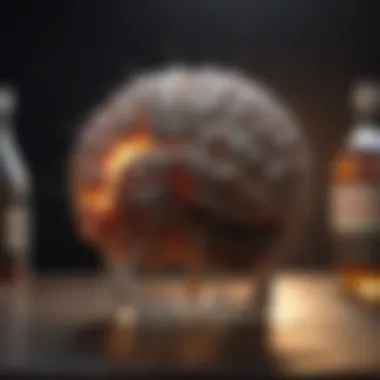Exploring the Link Between Binge Drinking and Seizures


Intro
Binge drinking is a pattern of excessive alcohol consumption that poses significant risks to physical and mental health. It has become increasingly prevalent, especially among young adults. However, not all consequences of binge drinking are widely recognized. One of the most alarming is its link to seizures, which can have severe implications for neurological health. Understanding this relationship is essential for developing effective prevention strategies and treatment options for those affected.
Key Concepts and Terminology
Definition of Key Terms
To address the connection between binge drinking and seizures, it is crucial to define some terms:
- Binge Drinking: This is typically defined as consuming a large quantity of alcohol in a short period. For men, this often means five or more drinks within about two hours. For women, the threshold is four or more drinks.
- Seizures: A seizure is a sudden, uncontrolled electrical disturbance in the brain. This can cause changes in behavior, movements, feelings, and levels of consciousness.
- Neurological Health: This encompasses the health and functioning of the nervous system, including the brain, spinal cord, and peripheral nerves.
Concepts Explored in the Article
The article delves into several key concepts relevant to binge drinking and seizures:
- The physiological mechanisms that link excessive alcohol intake to neuronal instability.
- The risk factors that predispose certain individuals to seizures following binge drinking episodes.
- Preventive measures and treatment options available to mitigate these risks.
Findings and Discussion
Main Findings
Research indicates that binge drinking significantly increases the risk of seizures. Alcohol acts as a depressant on the central nervous system, leading to imbalances in neurotransmitters. These imbalances can trigger seizures in individuals who binge drink. Additionally, certain groups, such as those with a history of epilepsy or alcohol withdrawal seizures, are at a higher risk.
"Excessive alcohol consumption disrupts the delicate balance of neurotransmitters in the brain, often leading to critical neurological events such as seizures."
Potential Areas for Future Research
- Longitudinal Studies: More extended studies to observe the long-term effects of binge drinking on neurological health.
- Genetic Factors: Research could focus on how individual genetic predispositions affect one’s risk of developing seizures from alcohol.
- Prevention Programs: Evaluating the effectiveness of targeted prevention programs that address binge drinking specifically.
The insights gained from this article can contribute to a better understanding of the serious consequences of binge drinking on neurological health and provide a foundation for public health initiatives aimed at reducing its prevalence and associated risks.
Prelims to Binge Drinking
Binge drinking is a significant public health concern that demands attention. Understanding this phenomenon is essential for grasping its potential consequences. Binge drinking implies excessive alcohol consumption over a short time frame. This behavior goes beyond casual drinking, often resulting in acute intoxication and various health issues.
In examining binge drinking, it becomes clear that its prevalence is alarming. Statistics show that a substantial proportion of adults and young people engage in such drinking patterns. This raises concerns not only for individual health but also for broader societal implications.
By exploring binge drinking, we can observe patterns that lead to adverse outcomes, including seizures. Knowledge of this relationship is crucial for developing strategies to mitigate risks associated with both binge drinking and its neurological impact.
Understanding the definition and prevalence of binge drinking sets the stage for addressing its societal impacts. Here, we will delve into how these drinking habits affect communities, healthcare systems, and individual lives.
Understanding Seizures
Understanding seizures is crucial to grasp the broader implications of binge drinking on neurological health. Seizures manifest as sudden, uncontrolled electrical disturbances in the brain, impacting an individual’s conscious awareness, movements, and bodily functions. Comprehending the complexities of seizures allows for better recognition of their relationship with binge drinking. The neurological impact of excessive alcohol consumption necessitates an exploration of how it alters brain function. This section will clarify key aspects related to the types of seizures, their causes, and the underlying neurological mechanisms, offering insights on why this understanding is essential in addressing alcohol-related health risks.
Types of Seizures
Seizures can be categorized into several types. The major classifications include:
- Focal Seizures: These seizures originate in a specific area of the brain. They can be further divided into simple focal seizures, which do not impair consciousness, and complex focal seizures, which do.
- Generalized Seizures: These affect both sides of the brain from the onset. They include tonic-clonic seizures, absence seizures, and myoclonic seizures, among others.
- Status Epilepticus: This is a prolonged seizure or series of seizures without recovery in between and is a medical emergency.
Each type presents unique symptoms and risks. Binge drinking may increase the likelihood of experiencing certain types of seizures, especially those that are generalized. Understanding these categories aids in diagnosis and treatment.


Causes of Seizures
Several factors can trigger seizures in individuals, particularly in the context of binge drinking. Notable causes include:
- Electrolyte Imbalances: Excessive alcohol can lead to dehydration and imbalances in electrolytes like sodium and potassium. These imbalances can disturb normal brain function, triggering seizures.
- Withdrawal Symptoms: Individuals who frequently binge drink may develop withdrawal symptoms when not consuming alcohol. Seizures can occur during these withdrawal phases.
- Pre-existing Neurological Conditions: Those with previous brain injuries or epilepsy may be more susceptible to seizures when engaging in binge drinking.
- Alcohol Poisoning: High levels of alcohol can lead to toxicity, significantly affecting brain activity.
Recognizing these causes is vital for public health interventions aimed at reducing the incidence of alcohol-related seizures.
Neurological Mechanisms
The neurological mechanisms behind seizures are complex. In the case of alcohol's influence, several key factors come into play:
- GABA and Glutamate Systems: Alcohol increases the effect of gamma-aminobutyric acid (GABA), an inhibitory neurotransmitter, while also decreasing glutamate, an excitatory neurotransmitter. This dual effect disrupts the equilibrium in the brain's signaling processes.
- Neuronal Hyperexcitability: Chronic alcohol consumption alters the thresholds for neuronal excitability, leading to a heightened risk of seizures. This phenomenon happens due to structural and functional changes in neuronal circuits.
- Brain Adaptation: With repeated binge drinking, the brain often adapts to the presence of alcohol. When deprived, it can become hyperactive, contributing to seizure activity.
Understanding these mechanisms is integral to designing effective treatment and prevention strategies for those at risk of seizures due to binge drinking.
The Physiological Effects of Alcohol on the Brain
When individuals engage in binge drinking, the fluctuations in alcohol levels lead to disruptions within the brain. The implications of these alterations are not limited to the short-term; they can have lasting effects on neurological health. Acknowledging these impacts is essential for appreciating the depth of the risk factors involved in alcohol consumption. Thus, this section focuses on two primary themes: alcohol's influence on neurotransmission and the resulting changes in brain chemistry.
Alcohol and Neurotransmission
Alcohol primarily interacts with various neurotransmitter systems in the brain. One notable effect is its action on gamma-aminobutyric acid, or GABA, which is a major inhibitory neurotransmitter. Alcohol enhances GABA's effects, leading to increased inhibitory signals in the brain, which can cause sedation and reduced neuronal excitability. This may temporarily prevent seizures during consumption. However, when binge drinking ceases and blood alcohol concentration drops, the brain undergoes a compensatory mechanism where inhibition decreases, and excitatory neurotransmitters, such as glutamate, increase.
This dynamic shift can create an unstable neuronal environment, increasing the likelihood of seizure activity. The disruption in balance between excitatory and inhibitory signals is thus crucial for understanding the mechanisms that predispose binge drinkers to seizures.
Alterations in Brain Chemistry
Chronic exposure to alcohol results in several biochemical changes in the brain. These alterations can disrupt neuronal communication, leading to abnormal excitability. For instance, alcohol affects the levels of various neurotransmitters and their receptor sensitivity.
- Dopamine: Alcohol initially increases dopamine release, promoting feelings of pleasure. However, with continued use, the brain may become reliant on alcohol for dopamine release.
- Serotonin: Alcohol modulates serotonin systems, which can affect mood and anxiety levels. Disrupting serotonin’s normal function can influence seizure threshold.
- Glutamate: Binge drinking raises glutamate levels after acute withdrawal due to excitatory rebound, heightening seizure risk.
Adverse alterations in these neurotransmitter systems can lead to not just temporary discomfort during withdrawal but also long-term damage, which may manifest as persistent seizures.
"The complexity of alcohol's effects on neurotransmitters illustrates the brain's delicate balance and the potential dangers inherent in binge drinking."
In summary, the physiological effects of alcohol on the brain establish a foundation for understanding the profound impact binge drinking has on seizure activity.
Link Between Binge Drinking and Seizures
Understanding the connection between binge drinking and seizures is crucial for grasping the broader implications of excessive alcohol consumption on neurological health. Binge drinking, often defined as consuming large quantities of alcohol in a short time, can significantly alter brain function. These changes may predispose individuals to seizures, raising concerns in both medical and rehabilitative contexts.
When binge drinking occurs, the body experiences rapid fluctuations in blood alcohol levels. This instability can adversely affect neurotransmission, leading to alterations in electrical activity in the brain. Impaired neurotransmitter systems can result in an increased likelihood of seizure activity. Moreover, understanding these mechanisms aids in identifying populations at risk, which is essential for effective prevention strategies.
Mechanisms Leading to Seizures
Several biological processes underpin the onset of seizures in those who engage in binge drinking. The core mechanism involves the elevation of neuronal excitability. Alcohol depresses the central nervous system initially, but as it is metabolized, excitatory pathways can become exaggerated, leading to hyperactive states.
- Glutamate Release: Alcohol withdrawl after heavy drinking increases glutamate levels, a key excitatory neurotransmitter. Excess glutamate can overstimulate neurons, heightening the risk of seizures.
- Gamma-Aminobutyric Acid (GABA) Alterations: Alcohol enhances GABA activity initially, leading to sedation. However, with chronic use, the GABA system may become impaired, reducing its protective effects against seizures.
- Neuroinflammation: Prolonged alcohol use can trigger inflammatory responses in the brain. This neuroinflammation has been associated with the development of seizure disorders.
Understanding these mechanisms provides insights into patient management and potential treatments.
Risk Factors for Alcohol-Induced Seizures


Identifying specific risk factors can help in the prevention and treatment of seizures induced by binge drinking. Several of these factors include:
- Frequency of Binge Episodes: More frequent binge drinking increases the cumulative risk of developing seizure activity.
- Personal History of Seizures: Individuals with a prior history of seizures face a higher risk with binge drinking.
- Co-occurring Mental Health Disorders: Conditions such as anxiety and depression can increase alcohol consumption, which in turn may precipitate seizures.
- Alcohol Withdrawal: Those who stop drinking abruptly after binge periods can experience severe withdrawal symptoms, including seizures.
It is essential to educate individuals about these risk factors to minimize potential health impacts associated with excessive alcohol consumption.
In summary, the exploration of the link between binge drinking and seizures reveals complex interplays of physiological mechanisms and risk factors that are critical for understanding long-term health consequences.
Clinical Evidence and Case Studies
Research Findings
Numerous studies investigate the connection between binge drinking and seizure occurrences. One significant finding is that excessive alcohol intake can lead to a state of hyperexcitability in neuronal tissues. This effect can result in seizures, particularly in individuals who already possess underlying health conditions such as epilepsy. A study published in the Journal of Neurology noted that binge drinkers are 20% more likely to experience seizures than their non-binge drinking counterparts.
Moreover, research indicates that alcohol withdrawal can provoke seizures, particularly in chronic heavy drinkers. According to findings by the National Institute on Alcohol Abuse and Alcoholism, withdrawal seizures occur in approximately 5% to 10% of those who undergo detoxification. This aspect underscores the interplay between binge drinking habits and seizure risks, highlighting the necessity for clinical awareness and monitoring among this population.
Case Reports of Binge Drinkers
Case reports offer individualized insights that can enrich our understanding of binge drinking and seizures. For instance, a documented case involved a young adult binge drinker who presented at an emergency room with generalized tonic-clonic seizures after a weekend of heavy drinking. The patient, with no previous history of seizures, was later diagnosed with alcohol-induced seizures.
Another case highlighted a middle-aged man whose long-term binge drinking habit led to recurrent seizure episodes. In therapy, doctors discovered that his seizures were tied directly to his binge drinking patterns. After intervention, he managed to abstain from alcohol, and his seizure frequency significantly decreased.
These case reports emphasize the variability in presentation and the necessity for tailored interventions. They also confirm the need for thorough assessments in clinical settings to ascertain the potential risks associated with binge drinking.
When clinicians recognize the link between binge drinking and seizure activity, it opens pathways for preventive measures and effective treatment plans.
Preventing Binge Drinking and Associated Health Risks
Preventing binge drinking is essential in mitigating its severe health risks, including the development of seizures. By examining ways to address this issue, the article emphasizes the interconnectedness of alcohol consumption behaviors and neurological disorders. Prevention strategies can significantly reduce the incidence of binge drinking, thereby decreasing the likelihood of alcohol-induced seizures. Furthermore, a focused approach to public health education can foster a healthier society.
Educational Initiatives
Educational initiatives play a pivotal role in preventing binge drinking. These programs aim to raise awareness about the dangers of excessive alcohol consumption. Effective education should target various audience groups, including high school students, college-aged individuals, and adults.
- Curriculum Development: Schools and universities may integrate alcohol education into their existing curriculums. These programs can include discussions on the physiological effects of alcohol, safe drinking practices, and the risks of binge drinking.
- Peer-Led Discussions: By utilizing peer-led initiatives, members of a community can share experiences and insights that resonate effectively with their contemporaries. Peer influences can shape attitudes towards alcohol use and contribute to changing drinking behaviors.
- Workshops and Seminars: Hosting workshops can deliver in-depth information on the effects of binge drinking. Such events can cover topics like healthy coping mechanisms and provide resources for support.
- Online Resources: With the rise of digital communication, online platforms can reach a wider audience. Websites can provide factual information on binge drinking, its risks, and how to seek help. Relevant materials could be shared via Facebook or educational forums like Reddit to improve visibility.
These educational initiatives are critical. They aim not only to inform but also to empower individuals and communities to make healthier choices concerning alcohol consumption.
Public Health Strategies
Public health strategies complement educational initiatives in tackling binge drinking. These approaches encompass a broader societal perspective, focusing on policy changes that can influence alcohol availability and consumption rates.
- Legislation and Regulation: Governments can introduce stricter laws regarding alcohol sales, including increasing the minimum drinking age or limiting alcohol advertising. Appropriate regulations can reduce accessibility and, as a result, potentially lower binge drinking rates.
- Community Programs: Initiatives at the community level can provide supportive environments for individuals. Programs may include sober events that cater to those wishing to abstain from alcohol and healthy activities promoting alternative socialization.
- Screening and Intervention: Health care providers can implement routine screening for alcohol use disorders. Identifying at-risk individuals can lead to timely interventions, significantly lowering the risk of escalating drinking habits that may result in seizures.
- Support Services: Ready access to support groups and counseling services can significantly aid those struggling with binge drinking. Providing resources to those in need is crucial for fostering recovery and reducing the long-term impacts of alcohol abuse.
"Community efforts are vital in creating awareness about binge drinking and its associated health risks."
Through the combination of educational initiatives and public health strategies, society can make strides toward reducing binge drinking rates and improving neurological health outcomes.
Treatment Options for Binge Drinking and Seizures
The issue of binge drinking and its relationship with seizures encompasses more than just understanding the risks. It also requires us to explore effective treatment options. Addressing these conditions is vital, as it can prevent potential health crises and improve long-term outcomes for affected individuals. There is a blend of medical interventions and psychosocial approaches that can provide relief and support to those struggling with these issues.
Medical Interventions
Medical intervention is often a critical component when dealing with severe consequences of binge drinking and associated seizures. These interventions can include pharmacological treatments and clinical monitoring. Common medications used for managing alcohol withdrawal and seizure activity are benzodiazepines, such as lorazepam and diazepam. These medications help to stabilize neuronal activity and can prevent seizure occurrences in high-risk situations.


Additionally, anticonvulsants like phenytoin and levetiracetam are prescribed for individuals who experience seizures as a direct result of alcohol use. These medications work by modulating neurotransmitter levels, ultimately leading to a decrease in seizure frequency.
Furthermore, ongoing medical supervision is important. This often involves hospitalization for individuals experiencing severe withdrawal or status epilepticus. Continuous monitoring allows for timely adjustments in medication and ensures safety during this critical period.
- Key Considerations for Medical Interventions:
- Timely administration of medications may significantly reduce risk.
- Regular follow-ups are essential for adjusting treatment regimens.
- Close monitoring during detoxification can prevent complications.
Psychosocial Approaches
Psychosocial approaches are equally important when treating binge drinking and seizures. These strategies focus on behavioral therapy and support systems. Cognitive-behavioral therapy (CBT) helps individuals understand the triggers and underlying issues related to their alcohol use. This therapeutic approach promotes healthier coping mechanisms and can lead to reduced binge drinking episodes.
Support groups, such as Alcoholics Anonymous, provide emotional support and shared experiences among individuals going through similar challenges. These communal approaches create a sense of belonging and accountability, which can be crucial in recovery.
- Additional Considerations for Psychosocial Approaches:
- Incorporating family support in treatment plans can improve outcomes.
- Building resilience through therapy helps in managing triggers effectively.
- Consistency in attending group sessions foster long-term sobriety.
It is essential to understand that a combination of both medical and psychosocial interventions often yields the best results for those affected by binge drinking and seizures.
Long-term Consequences of Binge Drinking
Understanding the long-term consequences of binge drinking is crucial in discussing the impact of excessive alcohol consumption on health. The repercussions extend beyond immediate physical effects and play a significant role in shaping both neurological health and mental well-being. Considering these consequences is vital for both individuals and public health systems.
Neurological Damage
Binge drinking can lead to various forms of neurological damage that often manifest over time. One of the main concerns is the potential for cognitive decline. Repeated episodes of heavy drinking can result in a decrease in brain volume, especially in areas critical for memory and learning, such as the hippocampus. This loss can cause long-term issues with memory retention and recall, creating challenges in everyday functioning.
Alcohol also disrupts the balance of neurotransmitters in the brain. Chronic exposure can impair the production and regulation of essential chemicals, leading to increased risks of developing neurological disorders. One such disorder is alcohol-related dementia, characterized by a deterioration in cognitive functions.
Moreover, individuals who engage in binge drinking may experience heightened seizure risk due to neuronal instability. Binge drinking creates an environment of excitotoxicity, where neurons may become overwhelmed and damaged. This can lead to permanent alterations in brain function, making individuals more susceptible to seizures over time.
"The ramifications of binge drinking on the brain are profound, often leading to irreversible changes that affect cognition and stability."
Mental Health Implications
The connection between binge drinking and mental health issues is also notable. Over time, individuals who binge drink are more likely to experience feelings of anxiety and depression. This correlation is complex; heavy drinking can exacerbate underlying mental health conditions, as well as lead to the development of new issues due to chemical imbalances.
Furthermore, binge drinking may lead to substance abuse disorders, where individuals may find themselves relying on alcohol as a coping mechanism. Such behaviors can cultivate a cycle of dependency that perpetuates mental health challenges, including increased isolation and social withdrawal.
The stigma associated with excessive drinking may also prevent individuals from seeking help. People may feel embarrassed about their consumption habits, leading them to hide their struggles rather than address them through proper channels. This avoidance often magnifies the underlying problems.
In summary, the long-term consequences of binge drinking cover a spectrum of neurological and mental health concerns. Understanding these impacts is essential not only for individual health but also for community well-being. Taking proactive steps in education and prevention can mitigate the risks associated with binge drinking.
Closure
The topic of binge drinking and its relationship with seizures holds significant importance in the realms of public health, neurology, and addiction studies. Understanding this connection can lead to enhanced treatment protocols and better preventive strategies. The discussion around binge drinking encompasses various health risks, with seizures representing a critical consequence that requires attention.
Summary of Findings
- Physiological Mechanisms: Binge drinking disrupts normal neuronal function. Excessive alcohol affects neurotransmitter systems, leading to instability in brain electrical activity.
- Risk Factors: Individuals who engage in binge drinking are at a higher risk of experiencing seizures. Factors such as frequency of episodes, duration of consumption, and preexisting medical conditions compound this risk.
- Clinical Evidence: Research consistently shows a correlation between alcohol-induced seizures and binge drinking behaviors. Case studies underline the urgency of this connection, highlighting the need for immediate medical intervention in severe situations.
Recognizing these issues enables health professionals to create more effective treatment plans and educate the public about the dangers of heavy drinking.
Future Research Directions
Future studies should focus on several key areas to better understand and address the issues related to binge drinking and seizures:
- Longitudinal Studies: Investigating the long-term effects of binge drinking on brain health will provide valuable insights into chronic conditions arising from acute episodes.
- Intervention Strategies: Research should evaluate the efficacy of different intervention methods aimed at reducing binge drinking and its direct impact on seizure occurrences.
- Genetic and Environmental Factors: Understanding how genetics and other environmental factors contribute to individual susceptibility to alcohol-related seizures can help in tailoring personalized treatment approaches.
By pursuing these research avenues, scholars can shed light on unresolved questions and foster a deeper understanding of how to mitigate the risks associated with binge drinking.







